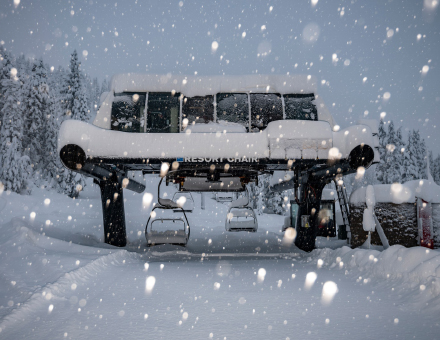SAM Magazine—Ludlow, Vt., Dec. 20, 2021—Snowstorms in the East and West have arrived just in time for ski areas to expand open terrain ahead of what is shaping up to be a robust holiday period.  Snow falling at Palisades Tahoe, December 14 But with Covid cases surging and the Canadian border tightening, January business is looking less secure.
Snow falling at Palisades Tahoe, December 14 But with Covid cases surging and the Canadian border tightening, January business is looking less secure.
For those areas that are open, this holiday period is likely to be a win, even with the uptick in Covid cases.
“The numbers are staggering,” said Tom Foley, SVP of business process and analytics for Inntopia, of Christmas holiday bookings. “Short of a complete shutdown, I don’t know what would put a dent in those numbers.”
Looking a few weeks ahead, though, Foley said, “We are starting to see some softness in the data related to omicron. There is a drop off in booking volume, and a moderate uptick in cancellation volume.”
That booking trend has been typical throughout the pandemic. “Since the beginning of this pandemic, we have been able to use Covid-19 cases as a leading indicator of booking volume,” said Foley. “Without fail, any increase in cases that has lasted more than 10 days has led to a decrease in volume. Any decrease in cases has led to an increase in booking volume. We should expect that this current surge is going to result in a lower booking volume across mountain destinations.”
Low snow and other complicating factors. Foley said that it is typical to see a softening in booking volume ahead of the Christmas period, but that low snow and limited terrain are likely contributing to the drop off in booking and uptick in cancelations.
As such, the turnaround in weather is expected to help redress the situation. “I think we can safely assume that the storms that are coming and the incredible snowmaking systems areas have will help to offset the effects of the challenging snow start,” said Foley.
In Canada, a slightly different story is playing out. The federal and provincial governments have responded to surging Covid cases by tightening restrictions. The federal government has reinstated testing requirements for those crossing the border (a negative test taken within 72 hours must be shown for entry), while provincial governments are cracking down on gatherings and vaccine checks.
Still, said Paul Pinchbeck, president and CEO of the Canadian Ski Council, “I think this is good for the industry. There has not been an utter ban on travel, and certainly early last week that was very much part of the discussion on the provincial and federal level.”
“But we are still in the early days,” he warned.
Adding more steps to the international travel rigmarole will affect business from the U.S. “The impact on Canada’s destination ski areas is significant,” said Pinchbeck of the tightening restrictions. “There are about 1.5 million ski area visits that come from the U.S.,” he added, noting that the vast majority of those visitors are staying longer and, thus, spending more.
The effects of a more stringent border policy will be felt in the U.S., as well. “What we are hearing already is that, between the government advisory not to leave Canada and the added hoops for international travel, Canadians are going to stay in Canada,” said Pinchbeck.
The costs of Covid testing for traveling Canadians can be upwards of $250 per test, he said. “It’s not something one can ignore, particularly if you are a family of four traveling across the border for your weekend.”
Steve Wright, president and GM of Jay Peak, Vt., which does robust Canadian business in a typical year, said the new testing requirements “will pretty much wipe out our season pass business on the Canadian side (as season pass holders are going to test on each trip) and will hurt our weekend business.”
“But,” he added, “the higher yielding weeklong holiday business should be OK, and we’re opening up an on-campus testing clinic. That will help.”
In both countries, a healthy domestic market will likely partially compensate for the diminished international market. “The domestic market is doing well, and that might offset some lost business,” noted Pinchbeck.
The situation is evolving, though. “It is such a fast-moving situation that there will be changes,” said Pinchbeck. He is anticipating that many resorts will expand their Covid protocols.
Le Massif in Quebec has already updated some of its Covid policies. Only passholder and ticket holders—those who have already had their vaccine passport and identity card verified—will be allowed in the base and summit chalets going forward. Restaurants and bars will remain in operation, but capacity has been reduced to 50 percent and masks indoors will be mandatory. The après ski scene will also see changes: seating is being reconfigured, and no dancing will be allowed (even with a mask on).
As the impacts of the new provincial and federal guidance become clear, other Canadian ski areas will inevitably follow suit, updating their safety protocols. Pinchbeck said he won’t be surprised if masks, for example, are again ubiquitous at Canadian ski areas.
With little federal or state guidance, it remains to be seen as to whether the same will be true at ski areas in the U.S.




